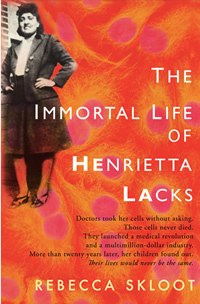Henrietta Everlasting
Rebecca Skloot takes The Immortal Life of Henrietta Lacks on the road
Publisher’s Weekly saw it coming before anyone else: on November 9, 2009, almost three months before the book hit shelves, the publishing industry’s trade magazine ran a cover story titled “The Making of a Bestseller 2010.” The bestseller-to-be was Rebecca Skloot‘s The Immortal Life of Henrietta Lacks, and the three-article package included a profile of the author, an excerpt from the book, and an essay by Skloot about planning her own book tour—a tour she kicked off this week in New York City and which continues in an almost uncountable number of locations for the next four months. The book went on to earn starred reviews from all four pre-publication review organizations: PW, plus Booklist, Library Journal, and Kirkus Reviews. It is a Barnes & Noble Discover Great New Writers title for spring 2010, the February title of the month for both Self and Popular Science magazines, and one of Chicago Tribune‘s “Great Discoveries in New Science Books.” And all this happened before the book even came out.
 A work of science journalism that includes elements of memoir, social history, and medicine—with a dose of voodoo and an exorcism thrown in for good measure—The Immortal Life of Henrietta Lacks tells the story of a young black woman who died at Johns Hopkins in 1951 of a virulent form of cervical cancer, leaving behind five tiny children and the first immortal cell line in human history. In the nearly six decades since Henrietta Lacks died, cells collected during her biopsy at Johns Hopkins have been kept alive in culture by scientists studying virtually every aspect of medicine. HeLa cells, as they are known, were used to create the polio vaccine and in vitro fertilization, as well as treatments for cancer, AIDS, diabetes, and Parkinson’s disease. They have been shot into space and subjected to nuclear blasts. They were instrumental in the development of both gene-mapping and cloning. But neither Henrietta Lacks nor any member of her family has ever received a single penny from the multimillion-dollar industry that has resulted from the HeLa line of cells.
A work of science journalism that includes elements of memoir, social history, and medicine—with a dose of voodoo and an exorcism thrown in for good measure—The Immortal Life of Henrietta Lacks tells the story of a young black woman who died at Johns Hopkins in 1951 of a virulent form of cervical cancer, leaving behind five tiny children and the first immortal cell line in human history. In the nearly six decades since Henrietta Lacks died, cells collected during her biopsy at Johns Hopkins have been kept alive in culture by scientists studying virtually every aspect of medicine. HeLa cells, as they are known, were used to create the polio vaccine and in vitro fertilization, as well as treatments for cancer, AIDS, diabetes, and Parkinson’s disease. They have been shot into space and subjected to nuclear blasts. They were instrumental in the development of both gene-mapping and cloning. But neither Henrietta Lacks nor any member of her family has ever received a single penny from the multimillion-dollar industry that has resulted from the HeLa line of cells.
“She’s the most important person in the world, and her family living in poverty,” one of Henrietta’s grown children told Skloot. “If our mother so important to science, why can’t we get health insurance?”
 This tension—between the human drama of Henrietta’s story and the medical marvels made possible by HeLa cells—is one reason the book hit shelves on Tuesday to an absolute explosion of media attention and immediately shot to the top of the Amazon.com bestseller list. Another is Skloot’s own story: the fascinating ten-year odyssey that took her from tobacco fields to gleaming medical laboratories in search of the woman behind the HeLa line. Finally, according to Chapter 16‘s Michael Ray Taylor, it’s just a masterfully written book. For more media coverage, click on the links below:
This tension—between the human drama of Henrietta’s story and the medical marvels made possible by HeLa cells—is one reason the book hit shelves on Tuesday to an absolute explosion of media attention and immediately shot to the top of the Amazon.com bestseller list. Another is Skloot’s own story: the fascinating ten-year odyssey that took her from tobacco fields to gleaming medical laboratories in search of the woman behind the HeLa line. Finally, according to Chapter 16‘s Michael Ray Taylor, it’s just a masterfully written book. For more media coverage, click on the links below:
~the donation page of the Henrietta Lacks Foundation, a fund Rebecca Skloot established to provide college scholarships to the descendants of Henrietta Lacks;
~a long excerpt from The Immortal Life of Henrietta Lacks in O magazine;
~a glowing review in The New York Times;
~a segment about HeLa cells on ABC’s World News Tonight;
~an interview with Fresh Air‘s Terry Gross on NPR;
~a review in The Boston Globe;
~a review in Forbes;
~a feature on the book, along with a slide show Skloot narrates, at the online version of The Scientist magazine;
~a review in The Washington Post;
~a chart at wired.com detailing all the different uses of HeLa cells;
~a statement from Johns Hopkins Medicine about HeLa cells and their use;
~a Q&A with Rebecca Skloot in Smithsonian;
~an interview with Skloot on NPR’s All Things Considered;
~a feature in the Los Angeles Times on Skloot’s unconventional marketing campaign;
~an interview with Skloot in the Los Angeles Times;
~a review of The Immortal Life of Henrietta Lacks, which Salon calls “a heroic work of cultural and medical journalism”;
~an essay in The Independent about Henrietta Lacks and the HeLa line;
~an op-ed piece in the Chicago Tribune about science and race;
~a review of The Immortal Life of Henrietta Lacks in The New York Times Book Review;
~a summary of the book’s highlights in Newsweek;
~ “Iniside the List” of bestsellers in The New York Times;
~an examination of the ethics of cell research in Reuters;
~a review in the San Francisco Chronicle;
~an interview with Rebecca Skloot in Radio Times on WHYY;
~an interview on Science Friday;
~a review in the The Seattle Times;
~a discussion of the book’s bestselling status in The New York Times;
~review in Discover magazine;
~a profile of Rebecca Skloot in the Memphis Commercial Appeal;
~a review in Entertainment Weekly;
~a feature about the book in the Minneapolis StarTribune;
~a review in Psychology Today;
~a Q&A in USA Today about the uses of HeLa cells in medicine;
~Stephen Colbert’s interview with Rebecca Skloot on The Colbert Report;
~a CBS News segment on The Immortal Life of Henrietta Lacks;
~a behind-the-scenes look at the making of a bestseller in Politics Daily.